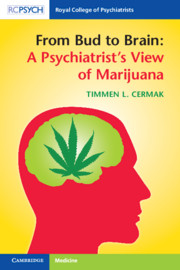Book contents
- From Bud to Brain: A Psychiatrist’s View of Marijuana
- From Bud to Brain: A Psychiatrist’s View of Marijuana
- Copyright page
- Dedication
- Contents
- Foreword
- Acknowledgments
- Introduction
- Section 1 The Science of Marijuana and the Brain
- Section 2 The Science and Art of Healing
- Chapter 10 Cannabinoid-Based Medication
- Chapter 11 Understanding and Encouragement
- Chapter 12 Principles of Motivational Interviewing
- Chapter 13 Treatment of Regular Heavy Marijuana Users
- Section 3 The History and Art of Marijuana Policy
- Section 4 Epilogue
- Index
Chapter 13 - Treatment of Regular Heavy Marijuana Users
from Section 2 - The Science and Art of Healing
Published online by Cambridge University Press: 31 March 2020
- From Bud to Brain: A Psychiatrist’s View of Marijuana
- From Bud to Brain: A Psychiatrist’s View of Marijuana
- Copyright page
- Dedication
- Contents
- Foreword
- Acknowledgments
- Introduction
- Section 1 The Science of Marijuana and the Brain
- Section 2 The Science and Art of Healing
- Chapter 10 Cannabinoid-Based Medication
- Chapter 11 Understanding and Encouragement
- Chapter 12 Principles of Motivational Interviewing
- Chapter 13 Treatment of Regular Heavy Marijuana Users
- Section 3 The History and Art of Marijuana Policy
- Section 4 Epilogue
- Index
Summary
Every clinician encounters patients compromised by marijuana, whether fully addicted or not and whether recognized by the individual or not. While adult heavy users usually seek help themselves (often in response to a partner’s pressure or for reasons seemingly unrelated to marijuana use), the parents of heavy adolescent users usually make the initial contact. The Cannabis Youth Treatment Study (CYT) demonstrated that several manualized brief treatment protocols have similar, but limited, success treating adolescents and recommended greater focus on long term monitoring and care. Although CYT established an evidence base for treatment, it was unable to evaluate the skill of individual therapists to engage patients and develop mutual ground for discussion. A motivational interviewing (MI) framework is presented emphasizing engagement and nonjudgmental exploration of patients’ experience and attachment to marijuana. The clinician’s curiosity about each individual’s favorite subjective experiences when high is used to discuss explanations for marijuana’s effects. Scientific information paves the way for introducing the concept of downregulation and potential negative side effects that create cognitive dissonance. The goal is to avoid evoking defensiveness and to help patients struggle with their own internal doubts about marijuana’s ability to help reach their life goals.
Keywords
- Type
- Chapter
- Information
- From Bud to Brain: A Psychiatrist's View of Marijuana , pp. 184 - 198Publisher: Cambridge University PressPrint publication year: 2020



